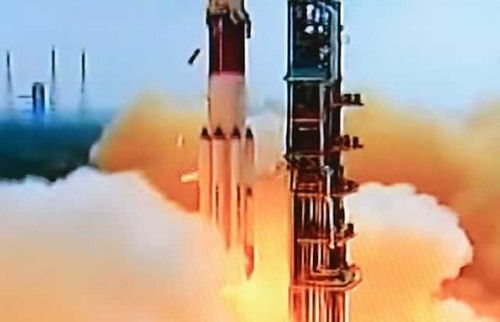
Spaceship takes off from India. The Asian state has embarked upon a Mars exploration project., a photo by Pan-African News Wire File Photos on Flickr.
Indian Mars mission blasts off successfully
November 6, 2013
NEW DELHI. – India’s first mission to Mars blasted off successfully yesterday, completing the first stage of an 11-month journey that could see New Delhi’s low-cost programme win Asia’s race to the Red Planet.
A 350-tonne rocket carrying an unmanned probe flew into a slightly overcast sky on schedule at 2:38pm, monitored by dozens of tense-looking scientists at the southern spaceport of Sriharikota.
After 44 minutes, applause broke out around the control room after navigation ships in the South Pacific reported that the spacecraft had successfully entered orbit around Earth.
Indian Space Research Organisation chairman K. Radhakrishnan allowed himself a smile, slapped a colleague on the back and announced he was “extremely happy” that the first objective had been reached.
At the end of this month, once enough velocity has been built up by the spacecraft as it circles our planet, “the great, long, difficult voyage will start” to Mars, he announced.
“In September 2014, we expect this spacecraft to be around Mars and the challenge then is to precisely reduce the velocity and get it into an orbit,” he explained in comments broadcast by state television.
The country has never before attempted inter-planetary travel, and more than half of all missions to Mars have ended in failure, including China’s in 2011 and Japan’s in 2003.
The Mars Orbiter Mission, known as “Mangalyaan” in India, was revealed only 15 months ago by Prime Minister Manmohan Singh, shortly after China’s attempt flopped when it failed to leave Earth’s atmosphere.
The timing and place of the announcement – in an Independence Day speech – led to speculation that India was seeking to make a point to its militarily and economically superior neighbour, despite denials from ISRO.
The gold-coloured probe, the size of a small car, will aim to detect methane in the Martian atmosphere.
This could provide evidence of some sort of primitive life form on the fourth planet from the sun.
President Pranab Mukherjee congratulated ISRO and called yesterday’s launch “a significant milestone” that would “go down as a landmark in our space programme”.
The mission has been hurriedly assembled and was carried into orbit by a rocket much smaller than US, European or Russian equivalents, which can blast directly out of Earth’s gravitational pull.
The cost of the project at US$73 million is less than a sixth of the US$455 million earmarked for a Mars probe by NASA which will launch later this month.
“We didn’t believe they’d be able to launch this early,” project scientist for the NASA Mars probe, Joe Grebowsky, told AFP before blastoff. “If it’s successful, it’s fantastic.”
He stressed that Mars, which has an elliptical orbit meaning it is between 50-400 million kilometres from Earth, was a far more complex prospect compared with a Moon mission which India completed in 2008.
“When you shoot a rocket at Mars you have to take into account that Mars is going to move a good deal before you get there. The Moon is fairly close,” he said.
There have been recent setbacks for India too, including when its Moon probe Chandrayaan lost contact with its controllers in 2009.
Another larger launch vehicle blew up after take-off in 2010.
The programme also has to contend with critics who say a country that struggles to feed its people adequately and where more than half have no toilets should not be splurging on space travel.
– AFP.
No comments:
Post a Comment